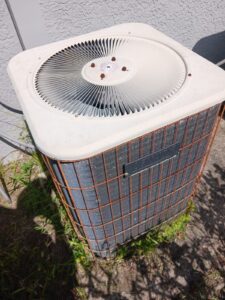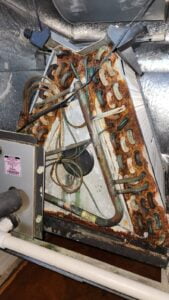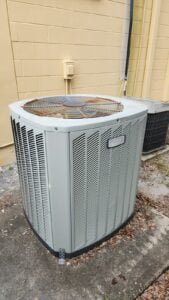How to prevent AC coil corrosion?
Hello, Tampa Bay residents! We’re The AC Therapist, your trusted local experts for all things HVAC. Today, we want to address an issue that many homeowners often overlook but could cause major headaches down the line: AC coil corrosion. From reduced efficiency to costly replacements, the consequences can be severe. Fortunately, we have good news. AC coil corrosion is preventable. Stick with us as we delve into a comprehensive guide to effective prevention strategies.
Why AC Coil Corrosion is a Big Deal
Before we explore the prevention methods, it’s crucial to understand the significance of coil corrosion. The coils in your air conditioner serve a vital function, they transfer heat. When these coils corrode, the efficiency of this heat transfer plummets. This can result in your AC unit working harder to cool your home, leading to increased energy bills and the potential for a complete system failure.
Types of Corrosion
Corrosion can manifest in several ways, particularly when it comes to metal components like air conditioner coils. Here are some common types of corrosion that you may encounter:
1. Galvanic Corrosion
This occurs when two different types of metals are in contact in the presence of an electrolyte, such as water. The metal that is more anodic will corrode faster than the one that is more cathodic.
2. Formicary Corrosion
Also known as “ant’s nest” corrosion, this is often hard to detect with the naked eye. It’s generally caused by exposure to organic acids, often found in household cleaning agents and some building materials. Formicary corrosion forms small tunnels in the metal, leading to reduced structural integrity.
3. Pitting Corrosion
Pitting is a localized form of corrosion that creates small holes or “pits” in the metal. This type is particularly dangerous because it can lead to the rapid deterioration of the metal, even though the overall material loss might be minimal.
4. Crevice Corrosion
This occurs in stagnant locations, such as crevices and spaces where oxygen is limited, leading to the creation of an acidic environment that accelerates corrosion.
5. Uniform Corrosion
Also known as “general corrosion,” this occurs uniformly over the entire surface of the metal. Though it’s easier to detect and manage, uniform corrosion can lead to material thinning and failure over time.
6. Intergranular Corrosion
This type of corrosion occurs along the grain boundaries of the metal, weakening its internal structure. It’s often caused by impurities in the metal or exposure to high temperatures.
7. Stress Corrosion Cracking
This is a combined mechanical and chemical process where a stressed metal part cracks under specific environmental conditions. This type of corrosion is common in metals that are under tensile stress and in the presence of corrosive substances.
8. Erosion Corrosion
This occurs when the metal surface is subjected to a combination of mechanical abrasion and chemical corrosion, often due to fast-flowing water or wind-driven particles.
Understanding the different types of corrosion can help in choosing the right prevention methods and materials, especially when it comes to maintaining HVAC systems and other critical equipment.
What Causes AC Coil Corrosion?
AC coil corrosion is typically caused by a combination of factors that include exposure to moisture, airborne chemicals, and the metal’s own properties. Here are some common causes:
- Moisture: Coils are designed to facilitate heat transfer, which often results in condensation. Persistent moisture can lead to corrosion.
- Airborne Chemicals: Fumes from household cleaning agents, paints, or even nearby swimming pools can cause or accelerate coil corrosion.
- Galvanic Corrosion: This occurs when different types of metals come into contact with each other, often in the presence of an electrolyte like water.
- Formicary Corrosion: Caused by exposure to organic acids, often found in household cleaning agents and sometimes in the air.
- Pitting Corrosion: This localized form of corrosion happens when the surface of the metal forms pits or holes, usually due to exposure to chlorides.
- Poor Maintenance: Lack of regular cleaning and maintenance can accelerate the corrosion process, allowing dirt and other substances to trap moisture against the coil.
- Environmental Factors: Coastal areas with salty air or industrial areas with chemical pollution can contribute to coil corrosion.
- Material Quality: Lower-quality metals are more prone to corrosion than higher-quality or specially coated materials.
Understanding the underlying causes of AC coil corrosion can help in effective prevention and timely intervention.
The AC Therapist’s 7 Proven Strategies for Preventing Coil Corrosion
Strategy #1: Regular Cleaning
Regular cleaning is a fundamental practice in preventing AC coil corrosion. Coils are a crucial component in your air conditioning system, and their efficiency in heat transfer is significantly reduced when they corrode. Dust, debris, and moisture can accelerate the corrosion process, making cleaning an essential maintenance task. Below are the steps and why it matters:
Why Regular Cleaning Matters
- Prevents Moisture Buildup: Dust and debris can trap moisture against the coils, providing a favorable environment for corrosion.
- Improves Efficiency: Clean coils operate more efficiently, which means your AC unit won’t have to work as hard to cool your home. This can result in reduced energy bills.
- Longevity: Regular cleaning extends the lifespan of your AC unit by maintaining the coils in optimal condition.
- Early Detection: Cleaning provides an opportunity to inspect the coils for early signs of corrosion, allowing for proactive measures.
How to Perform Regular Cleaning
Safety First
- Turn Off Your AC Unit: Always make sure the unit is off to avoid electrical hazards.
Cleaning Process
- Access the Coils: You’ll need to remove the access panel or protective grate to get to the coils.
- Vacuum Loose Debris: Use a soft brush attachment on a vacuum cleaner to remove any loose dust and debris from the coils.
- Use a Soft Brush: For more stubborn dirt, gently brush the coils. Be careful not to bend or damage the fins during this process.
- Apply a No-Rinse Coil Cleaner: These are available in spray bottles and foam. Apply the cleaner as directed by the manufacturer. The cleaner will foam up and then drip into the unit’s drain pan.
- Optional Rinse: Some prefer to rinse the coils with a gentle spray of water, although many coil cleaners are designed to be left on.
- Check the Drain Pan: Clean the drain pan with soap and hot water. A 50/50 solution of water and vinegar can also be used to prevent mold growth.
- Seal and Restart: Replace any panels or grates that you removed and turn the power back on to the unit.
Strategy #2: Therapy Maintenance Plans
At The AC Therapist, we understand that AC coil corrosion is a significant concern for homeowners, leading to inefficient systems and costly repairs. To combat this, we offer specialized Therapy Maintenance Plans designed to provide you with consistent, professional care for your HVAC systems. Let’s delve into how our plans can specifically help prevent AC coil corrosion.
Why Therapy Maintenance Plans Matter
- Consistency: Scheduled, professional maintenance means your AC unit is regularly inspected and cleaned, reducing the risk of corrosion.
- Early Detection: Our experts can identify signs of corrosion in its early stages, allowing for timely intervention.
- Expert Care: Professional cleaning and inspection ensure that no detail is overlooked, providing the best preventive care for your AC unit.
Features That Help Prevent AC Coil Corrosion
- Regular Cleaning and Inspection: Included in all our plans, this ensures that your coils are kept free from dust, dirt, and moisture that could lead to corrosion.
- Duct Sanitation: Available in our Premium and Elite Plans, duct sanitation helps improve air quality, reducing airborne corrosive agents.
- UV Light Installation: Included in our Elite Plan, UV light can reduce mold and bacterial growth on the coils, further reducing the risk of corrosion.
- Replacement Filters: Our Elite Plan includes filters for the year, ensuring optimal airflow and reducing the potential for moisture buildup.
- Discounts on Repairs: All our plans offer discounts on repairs, making it more affordable to address any issues before they become major problems.
Our Plans
1. Value Plan ($14.99/month)
- 1 maintenance visit per year
- 5% off on repairs
2. Premium Plan ($19.99/month)
- 2 maintenance visits per year
- Duct sanitation
- 10% off on repairs
3. Elite Plan ($29.99/month)
- 2 maintenance visits per year
- UV light installation
- Filters for the year
- 15% off on repairs
Strategy #3: Professional Installation
Why it Matters
Proper installation eliminates the risks of moisture accumulation around the coils.
How to Do It
- Trust the experts. Have your AC unit professionally installed to ensure proper drainage and leveling.
Strategy #4: Corrosion-Resistant Coatings
Corrosion-resistant coatings serve as a critical line of defense in prolonging the lifespan of AC coils and other metal surfaces. These coatings are engineered to prevent the destructive effects of corrosion, thereby enhancing durability and efficiency. Here’s a look at why you might consider these coatings, some common types, and how they are applied.
Why Consider Corrosion-Resistant Coatings?
- Extended Lifespan: Coatings can significantly extend the life of your AC coils, leading to longer intervals between replacements.
- Cost-Effective: The upfront investment in corrosion-resistant coatings can save on the long-term costs associated with coil replacement or frequent maintenance.
- Enhanced Efficiency: A well-maintained, corrosion-free coil operates more efficiently, helping you save on energy costs.
- Ideal for Harsh Environments: These coatings are particularly useful if your AC unit is exposed to harsh environmental factors like salt water, chemicals, or high humidity.
Common Types of Corrosion-Resistant Coatings
- Epoxy Coatings: Known for their durability, epoxy coatings provide strong corrosion resistance and are typically used in industrial settings.
- Polyurethane Coatings: These are known for their flexibility and are commonly used in residential applications due to their resistance to environmental factors like UV rays and moisture.
- Polymer Coatings: These are designed to be very thin yet effective, making them ideal for intricate components like AC coils.
- Zinc Coatings: A more traditional approach, zinc coatings are used in galvanizing processes and offer basic protection against corrosion.
- Specialized HVAC Coatings: Some coatings are specifically engineered for HVAC systems, offering optimal performance in both heat transfer and corrosion resistance.
Strategy #5: Control Indoor Humidity
Controlling indoor humidity is not just a matter of comfort; it’s also crucial for maintaining the health and efficiency of your HVAC system. Excessive humidity can lead to a multitude of issues, such as mold growth, compromised air quality, and even AC coil corrosion. Here’s how you can control indoor humidity effectively:
Why Control Indoor Humidity?
- Prevent AC Coil Corrosion: High humidity can lead to condensation on your AC coils, creating an environment where corrosion can occur.
- Improve Comfort: Excess humidity can make your home feel stuffy and uncomfortable, and can even affect your health.
- Energy Efficiency: A balanced indoor humidity level allows your HVAC system to run more efficiently, leading to lower energy bills.
- Air Quality: High humidity can facilitate the growth of mold, mildew, and bacteria, compromising the air quality in your home.
Strategies for Controlling Indoor Humidity
- Dehumidifiers: Using a dehumidifier can effectively reduce indoor humidity levels. Portable units are available, or you can opt for a whole-home system that integrates with your HVAC system.
- Proper Ventilation: Ensure that areas like the kitchen and bathrooms are well-ventilated, as these are places where humidity tends to accumulate.
- Use Exhaust Fans: Always use exhaust fans when cooking or showering to help remove excess moisture from the air.
- HVAC Maintenance: Regular maintenance of your HVAC system, especially the AC coils, can help in maintaining proper humidity levels. Our Therapy Maintenance Plans offer this as part of regular servicing.
- Seal Leaks: Inspect windows, doors, and ducts for leaks where humid outdoor air can enter. Sealing these leaks can improve the efficiency of your HVAC system and help control humidity.
- Plants and Humidity: Some indoor plants can absorb excess moisture from the air, acting as natural dehumidifiers.
- Smart Thermostats: These devices can monitor and control both temperature and humidity, optimizing the indoor environment.
- Time Your Showers and Cooking: If possible, try not to take long showers or cook moisture-intensive meals during the hottest parts of the day when the HVAC system is working hardest.
- Check Drainage: Ensure that your AC unit’s drainage system is working correctly so that it properly disposes of the moisture it collects from the air.
Strategy #6: Be Smart About Chemical Use
Chemical use within your home can have a ripple effect, impacting not just your indoor air quality but also the longevity and efficiency of your HVAC system. From cleaning agents to paint, the chemicals we use can lead to corrosion, reduced air quality, and other HVAC issues. Here’s how you can be smart about it:
Why Chemical Use Matters
- Corrosion Risk: Some harsh chemicals can accelerate the corrosion process on AC coils and other components of your HVAC system.
- Air Quality: Fumes and particles from chemical products can be circulated through your HVAC system, affecting the air you breathe.
- HVAC Strain: Harmful chemicals can contaminate air filters and other components, causing the system to work harder to maintain indoor air quality.
- Health Concerns: Volatile organic compounds (VOCs) from chemicals can cause various health issues, such as headaches and respiratory problems.
Smart Practices for Chemical Use
- Opt for Eco-friendly Products: Choose cleaning agents and paints that are low in VOCs and other harmful chemicals.
- Proper Ventilation: Always use chemicals in well-ventilated areas and consider switching on exhaust fans to remove fumes more rapidly.
- Use the Right Amount: Always read and follow the manufacturer’s instructions on how much to use. Using more than necessary doesn’t mean better cleaning and can harm your HVAC system.
- HVAC Shutdown: For major projects involving chemicals like painting or refinishing floors, consider temporarily shutting down your HVAC system to prevent the spread of fumes and particles.
- Regular HVAC Maintenance: Have your HVAC system regularly inspected and cleaned to remove any chemical buildup. Our Therapy Maintenance Plans can help with this.
- Air Purifiers and Filters: Consider using air purifiers and upgrading to higher-quality air filters that can capture chemical particles and fumes more effectively.
- Safety Gear: Always use gloves, masks, and any other recommended safety gear when using chemicals.
- Store Properly: Store chemical products in well-sealed containers and keep them in a place where they won’t damage your HVAC system, like a shed or a utility closet far from your unit.
- Limit Indoor Pesticide Use: Try to use pesticides outdoors and opt for less harmful alternatives for indoor use. Remember that these chemicals can also corrode your HVAC components.
Strategy #7: Choose the Right Materials
The materials used in your HVAC system can make a significant difference in its longevity, efficiency, and the quality of air in your home. From AC coils to ductwork and insulation, choosing the right materials can prevent issues like corrosion and help your system operate at peak efficiency. Here’s a guide on how to make smart material choices for your HVAC system:
Why Materials Matter
- Corrosion Resistance: Certain materials are more resistant to corrosion, which is vital for components like AC coils.
- Energy Efficiency: The right materials can enhance the energy efficiency of your system, helping you save on utility bills.
- Durability: High-quality materials can withstand wear and tear, extending the lifespan of your HVAC system.
- Air Quality: Materials that don’t off-gas or deteriorate easily contribute to better indoor air quality.
Key Components and Material Choices
1. AC Coils:
- Copper: Known for its superior heat transfer capabilities and resistance to corrosion.
- Aluminum: A lighter and less expensive option, but generally less durable than copper.
2. Ductwork:
- Galvanized Steel: Highly durable and resistant to corrosion.
- Aluminum: Lightweight and easy to install, but less sturdy compared to steel.
- Flexible Ducts: Useful for tricky spaces but should be of high quality to prevent air leakage.
3. Insulation:
- Fiberglass: Effective and inexpensive but should be well-sealed to prevent fiberglass particles from entering the air.
- Foam Boards: Offer excellent insulation but can be more expensive.
4. Air Filters:
- HEPA Filters: Highly effective for removing small particles.
- Carbon Filters: Good for removing odors and chemical fumes.
5. Thermostats:
- Plastic: Economical but less durable.
- Metallic: More robust and often more aesthetically pleasing.
Your Comprehensive Guide to Preventing AC Coil Corrosion with The AC Therapist
Preventing AC coil corrosion is not just about extending the lifespan of your HVAC system; it’s about safeguarding your investment, optimizing energy efficiency, and ensuring a comfortable and healthy living environment. From selecting corrosion-resistant materials and coatings to regular cleaning and controlling indoor humidity, there are multiple ways to combat this common issue.
Here at The AC Therapist, we understand that your HVAC system is a significant investment and a crucial part of your home. That’s why our Therapy Maintenance Plans are designed to provide regular checks, cleaning, and necessary adjustments to prevent corrosion and other common HVAC issues. Our expert technicians can guide you through material choices, recommend appropriate coatings, and even help you set up smart systems for humidity control.
Preventing AC coil corrosion is a multi-faceted approach that involves both proactive measures and regular maintenance. So why not let us be part of your HVAC health journey? Together, we can ensure that your system runs smoothly, efficiently, and most importantly, stands the test of time.











